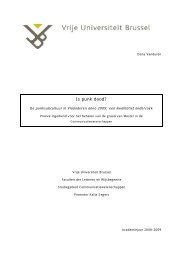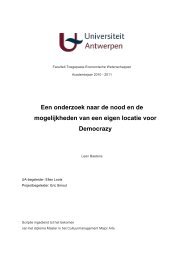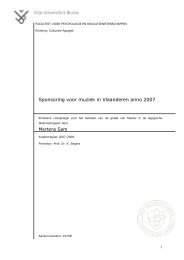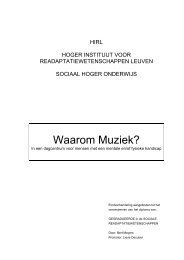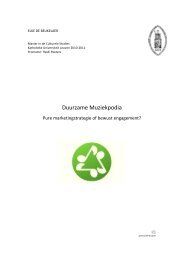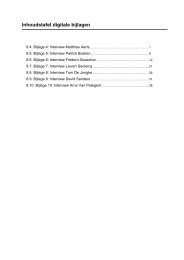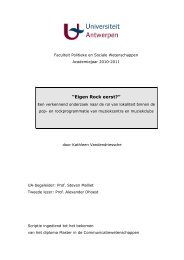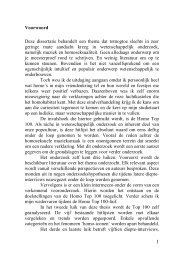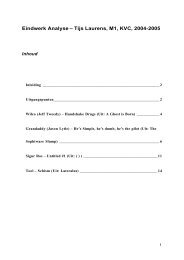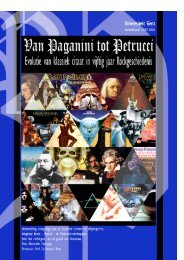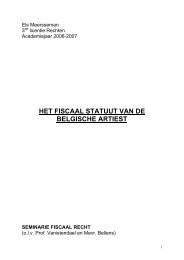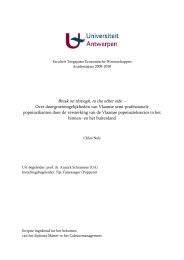Hip hop identity in a township reality. - Poppunt
Hip hop identity in a township reality. - Poppunt
Hip hop identity in a township reality. - Poppunt
Create successful ePaper yourself
Turn your PDF publications into a flip-book with our unique Google optimized e-Paper software.
languages, they directly refer to the country where they are spoken. For example:<br />
French is spoken <strong>in</strong> France, Russian is spoken <strong>in</strong> Russia, Portuguese is spoken <strong>in</strong><br />
Portugal and so on. Of course, this is not applicable for all countries. Lots of African<br />
countries took over the languages of their former colonial rulers, and they also have<br />
many other languages that do not refer to the name of the country. To state that<br />
most people see languages as strongly connected to the unity of a nation, we<br />
performed a small survey. We questioned 23 people (15 females and 8 males)<br />
randomly picked out from a s<strong>hop</strong> <strong>in</strong> the busy s<strong>hop</strong>p<strong>in</strong>g area of Oostende, Belgium.<br />
We asked them about the language(s) people speak <strong>in</strong> the follow<strong>in</strong>g countries:<br />
Kenya, Senegal and Congo D.R. It was astound<strong>in</strong>g how many people (11 females<br />
and 6 males) answered the question with ‘Kenyan’/‘Senegalese’/‘Congolese’, or even<br />
‘African’. Few people came up with answers like ‘French’ and ‘English’ (3 females<br />
and 1 male), but also misplaced them. Only one person (male) mentioned Swahili,<br />
another one (female) answered the question with ‘the local languages of the tribes’.<br />
From this survey (which is of course too narrow to be fully representative, but is a<br />
good illustration), we can conclude that a lot of people are unaware of the diversity<br />
of languages and the language use <strong>in</strong> African countries. But more importantly to us<br />
is the fact that a lot of people see languages and countries/nations as strongly<br />
<strong>in</strong>terconnected with each other. What also becomes apparent is that almost all<br />
respondent’s named only one language per country, apart from 3 people who<br />
mentioned both ‘African’ and ‘Kenyan’/‘Senegalese’/‘Congolese’. ‘African’ was<br />
spoken <strong>in</strong> all three of the countries accord<strong>in</strong>g to the respondents, which can<br />
highlight a greater l<strong>in</strong>k: the one between a whole cont<strong>in</strong>ent and a language. This<br />
last th<strong>in</strong>g can maybe be expla<strong>in</strong>ed by the fact that the African cont<strong>in</strong>ent still is quite<br />
a mystery to a lot of people. (Only one respondent had ever been to Africa, and that<br />
was on a beach vacation <strong>in</strong> Djerba, Tunisia.) Africa seems to be a criss-cross of<br />
countries that many outsiders do not know where to locate, with the consequence<br />
that it only consists <strong>in</strong> their m<strong>in</strong>ds as ‘the unit Africa’.<br />
The l<strong>in</strong>k between nation and language can also be considered from another angle.<br />
When a nation has more than one language, that nation is then bil<strong>in</strong>gual or<br />
multil<strong>in</strong>gual. Inhabitants of that country are thus unil<strong>in</strong>gual, bil<strong>in</strong>gual or<br />
multil<strong>in</strong>gual, dependent on the l<strong>in</strong>guistic repertoire they have built up dur<strong>in</strong>g their<br />
lifetime.<br />
The second term, <strong>identity</strong> and the connection it has with language, is extensively<br />
discussed <strong>in</strong> the follow<strong>in</strong>g part of our thesis. Even so, we will touch the subject<br />
briefly here <strong>in</strong> reference to code-switch<strong>in</strong>g. The question many scholars asked



